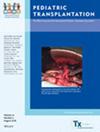小于 6 岁供体的儿科肾移植的长期结果
IF 1.2
4区 医学
Q3 PEDIATRICS
引用次数: 0
摘要
背景肾移植是目前治疗终末期肾病患者的最佳方法。然而,使用 6 岁以下捐献者的肾脏作为增加儿科受者器官库的一种可能性仍存在争议。我们的目的是研究供体年龄是否与肾脏移植的长期功能有关。方法对接受 3-6 岁供体移植的儿科受者的结果进行回顾性研究,并与接受 6 岁以上供体移植的结果进行比较。比较的变量包括累计移植物存活率、肾脏大小、抗蛋白尿治疗需求、肾小球滤过率、排斥反应发生率、肾盂肾炎、肾功能衰竭以及手术或肿瘤并发症。年龄较小的供体组 5 年的累积移植物存活率为 81%,而年龄较大的供体组为 98%(p <.05)。8 年时,6 岁捐献者的累计移植物存活率为 74%。至于平均估计移植物存活时间,年轻供体组为 11.52 年,年长供体组为 14.51 年。在随访期间,年轻供体组的肾脏肿大程度更高,需要进行抗蛋白尿治疗。老年捐献者组在随访的第一年中肾小球滤过率较高,随后两组的肾小球滤过率趋于一致。急性或慢性排斥反应、急性肾盂肾炎、急性肾功能衰竭、手术或肿瘤并发症的发生率在统计学上没有明显差异。本文章由计算机程序翻译,如有差异,请以英文原文为准。
Long‐term outcome of pediatric renal transplantation with donors younger than 6 years
BackgroundRenal transplantation is currently the best treatment option for patients with end‐stage renal disease. However, the use of kidneys from donors under 6 years of age as a possibility to increase the organ pool in pediatric recipients remains a controversial matter. We aimed to investigate whether donor age is associated to the long‐term functionality of the renal graft. Likewise, we analyzed the adaptation of the graft to the ascending functional requirements in the pediatric patient.MethodsRetrospective study of the results obtained in pediatric recipients transplanted with grafts from donors between 3 and 6 years of age, comparing them with those of grafts from donors older than 6 years. Among the variables compared are cumulative graft survival, renal size, need for antiproteinuric therapy, GFR, incidence of rejection, pyelonephritis, renal failure and surgical or tumor complications.ResultsA total of 43 transplants were performed with donors aged 3–6 years, and 42 transplants with donors older than 6 years. Cumulative graft survival at 5 years was 81% for the younger donor group compared to 98% for the older donor group (p < .05). At 8 years, cumulative graft survival for donors <6 years was 74%. As for the mean estimated graft survival, it was 11.52 years for the younger donor group and 14.51 years for older donors. During follow‐up, the younger donor group presented greater renal enlargement and need for antiproteinuric therapy. The older donors group had a higher GFR during the first year of follow‐up, which then equalized in both groups. There were no statistically significant differences in the incidence of acute or chronic rejection, acute pyelonephritis, acute renal failure or surgical or tumor complications.ConclusionsRenal transplants of grafts equal to or less than 6 years old have good short‐term and acceptable long‐term results in pediatric patients.
求助全文
通过发布文献求助,成功后即可免费获取论文全文。
去求助
来源期刊

Pediatric Transplantation
医学-小儿科
CiteScore
2.90
自引率
15.40%
发文量
216
审稿时长
3-8 weeks
期刊介绍:
The aim of Pediatric Transplantation is to publish original articles of the highest quality on clinical experience and basic research in transplantation of tissues and solid organs in infants, children and adolescents. The journal seeks to disseminate the latest information widely to all individuals involved in kidney, liver, heart, lung, intestine and stem cell (bone-marrow) transplantation. In addition, the journal publishes focused reviews on topics relevant to pediatric transplantation as well as timely editorial comment on controversial issues.
 求助内容:
求助内容: 应助结果提醒方式:
应助结果提醒方式:


